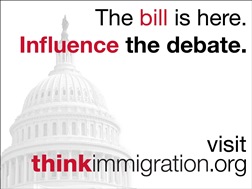Published on Sun, May 29, 2011
A piecemeal approach to immigration reform is the politically easy option, but there will be unintended negative consequences unless Congress addresses the whole problem.
An effective system to verify a job applicant's eligibility to work in the United States is an essential part of immigration reform. So are tough employer sanctions for those who hire the undocumented.
But if Congress just mandates the use of the employee-screening E-Verify system without dealing with labor demands, the job magnet will remain and the economy will suffer.
The agriculture industry is forthright in saying that up to 70 percent of its workforce is undocumented. There are no Americans to take those jobs.
"Are you raising your child to be a farmworker?" asks Tom Nassif, president of the Western Growers Association, which represents growers in California and Arizona. He says his industry has been trying to educate Congress about the simple fact that making E-Verify mandatory without addressing labor needs "wipes out agriculture."
John McClung, president of the Texas Produce Association, says E-Verify in isolation would be "the death knell" of agriculture in the United States . Without workers, farmers would move their cropland to where the labor is: Mexico and Central America. Nassif says two to three non-farm jobs are created for every farm job, so the result would be widespread job losses in the United States.
The other likely result, as Joe Sigg of the Arizona Farm Bureau points out, would be "under-the-table and off-the-books" employment.
Research bears this out. The nonpartisan Immigration Policy Center study, "Deeper Into the Shadows," found workers who lost their jobs because of enforcement tended to return to work - often at the same job - on a cash-only basis. They were generally paid less and became more vulnerable to exploitation.
E-Verify alone will create problems because it does not deal with the need for labor.Read more...
Published in the Arizona Republic





